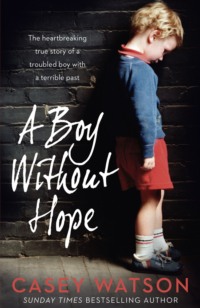
Полная версия
The Girl Without a Voice: The true story of a terrified child whose silence spoke volumes
My session on the computer done, I sat at my desk and watched Imogen intently. Shona, ever the mother hen, bless her, was doing her best to take charge of their little group. And, taking her lead, Molly seemed to be adapting to their unusual situation, understanding the need to provide a commentary, to compensate for the lack of reciprocation when either of them spoke to our newest Unit ‘recruit’. ‘That’s right, Imogen,’ she was saying, ‘Shona meant to criss-cross the straws there, just like you’ve drawn them. Well done.’
I had to smile. If you’d witnessed it cold you’d imagine they were speaking to a much younger child. But Imogen didn’t seem to mind. In fact, her expression, usually so deadpan, seemed to soften now the girls were clucking and fussing so much around her. Was that it? Did she lack attention? Feel excruciatingly self-conscious? It was so hard to fathom someone who didn’t speak. All those little clues. It wasn’t just what children had to say to you that mattered – you learned so much just from the way they spoke, too.
I was just pondering our little enigma when Kelly breezed in, beaming smiles for all, as per usual. Imogen glanced up, but I noticed she took very little interest. Not anxious, not nervous, not stressed by a new person. Perhaps shyness wasn’t a factor here at all.
‘You must have read my mind,’ I told Kelly, standing up to pop the kettle on for coffee. ‘I could actually do with nipping to the staffroom – got to make a phone call. If you’re free to hang around for a bit, that is.’
Kelly nodded. ‘If you’ll throw a chocolate digestive into the deal, I’ll happily stay,’ she said. ‘I’m free till lunchtime as it happens. All yours.’
I gave Kelly a quick update on what the children were up to and, before I left, sensing that I ought to let Imogen know what I was doing, went across to the girls’ table to let her know.
‘This is looking good,’ I told them all, looking at the planning notes they’d made already, then, lowering my voice, said, ‘You know, you might have a good chance of winning, girls. And, Imogen, your handwriting’s really neat.’
There was no reply from her, obviously, but I saw that same flutter of recognition that she’d understood and was pleased with what I’d said. What could it be like, I wondered, to have that barrier between yourself and the world? Did she want to respond, formulate an answer, yet be physically unable to deliver it, or was it a more conscious thing? What a curious thing it was. Particularly since she spoke normally at home.
Mrs Hinchcliffe didn’t seem particularly pleased to hear from me. In fact I got the impression as soon as she answered the phone that despite my having already mentioned that I’d like to, she felt my calling her was somehow irregular. I assured her that wasn’t the case; that, where practical, it was an important part of my role to try and work in co-operation with a child’s parents or guardians, to give them the best chance to deal with whatever their particular problems were and help ease them back into mainstream life in school.
‘Well, I don’t know that there’s much I can tell you,’ she said. ‘She was living with her dad before, as you know, and having lots of problems at her old school. Bullying, teasing, that sort of thing.’
‘Just her and Dad, then?’ I asked. ‘What about Mum?’
I heard her sigh. ‘No, no,’ she said. ‘I told you, Imogen lived with my son. It had just been the two of them since her mother walked out on the pair of them …’
‘Oh, dear. I’m sorry to hear that.’
‘Yes, well …’ said Mrs Hinchcliffe. ‘Believe me, you don’t know the …’ And then she checked herself. She was clearly anxious not to be indiscreet. ‘And they were fine …’
‘So does Imogen see her mum at all?’
‘No, she doesn’t. Not at the moment.’ I could hear the edge in Mrs Hinchcliffe’s voice still. ‘She’s been getting settled into her new life, and – well – it’s not really for me to say, Mrs Watson. It’s none of my business, is it?’
The implication being that it was none of mine either. But yes, it was her business. It was certainly her business. She was the one holding the flipping baby, wasn’t she?
‘I suppose not,’ I said anyway, because I didn’t want to antagonise her. What I really wanted to ask next was why he wasn’t bringing up his daughter. There must have been a reason, after all. But that would only antagonise Mrs Hinchcliffe further, I didn’t doubt, especially as I was fast getting the impression that my line of enquiry was one that wasn’t really considered relevant. I was being fed the line that it was bullying at school that had prompted Imogen’s selective mutism – but what about her mum? Might her absence from Imogen’s life have some bearing? I tried to imagine how Kieron or Riley might have coped if I’d disappeared suddenly from their lives – and I couldn’t. Losing a mother was a huge thing. Surely it must have contributed?
I took another tack. ‘So, Dad – your son – he’s on his own now, then, is he?’
‘No, not at all,’ said Mrs Hinchcliffe. ‘Graham has a new partner. Lovely girl, she is. That poor woman,’ she said with sudden animation. ‘It’s a lot to take on for anyone, isn’t it? Someone else’s child. And what with Graham working away …’
‘Oh,’ I said. ‘He works away, does he?’
‘He’s a coach driver, dear,’ she said. ‘European tours. Luxury ones …’ And with the emphasis on the ‘luxury’ bit. I could hear the pride in her voice.
‘Oh, I see,’ I said. ‘So his other half has to –’
‘His wife. Gerri, her name is. Lovely girl. Tried everything, she has, and – well, I’m sure you know how difficult children can be these days,’ she huffed. ‘It’s a miracle she didn’t walk out on him as well, frankly. Never stood a chance with Imogen, she didn’t. Not a chance. That’s why we’ve got her. I mean, what choice do we have? And she doesn’t see it, of course …’
‘What, your daughter-in-law?’
‘No! Imogen! No idea of the sacrifices her father’s made for her. She really hasn’t. I mean it’s her mum she should be bearing a grudge towards – I mean, anyone would say the same, wouldn’t they? Upping and leaving them like that. It’s not her dad she should be taking it out on, is it? I keep trying to tell her that, Mrs Watson. I mean, at least he flipping stayed with her … And poor Gerri. I’ve never known anyone so selfless. She’s the patience of a saint, that one. But, no … she can’t see that. Can’t see what’s plain as the nose on her face, that one.’
Mrs Hinchcliffe sighed again then, an exasperated sigh, and I got a strong impression that here was a lady who probably loved her grandchild dearly, but was emotionally exhausted with having so much responsibility on her shoulders, and at a loss to know what to do with Imogen by now. I also got the feeling that she was caught between two stools. I had the impression she was not only trying to be a good grandmother but a good mother, too. Taking the strain off her son. And perhaps a bit too much?
And what did she mean by ‘never stood a chance’? I decided not to press the point, however. ‘Oh dear,’ I said. ‘That’s sad. They don’t get along, then? Do you think that’s a factor in the mutism? Or did it start earlier? Some time after mum and dad split up, perhaps?’
But Mrs Hinchcliffe was having none of it. ‘No, I told you. It was that school. She was fine after the break-up. Well, not completely fine, obviously – would you be fine if your mother just upped sticks and left you? I imagine not, Mrs Watson. But she was still speaking. No, it was that dreadful school that did it – useless, they were. All the name-calling – because of her hair, because of her freckles, because of her mum having left – you name it.’
‘Children can be so cruel, can’t they?’
‘Oh, indeed they can, Mrs Watson. I don’t doubt you’ve seen plenty of that sort of thing for yourself. Just plain nasty. That’s when she shut down. And can you blame her? But she’s got to learn to deal with it, hasn’t she? She needs toughening up a bit. That’s what my husband says, and I agree with him. Needs to learn how to shrug it off more.’
There was another clear picture emerging; that of a rather ‘old school’ kind of grandad. A man keen to raise his granddaughter in a ‘no-nonsense’ kind of way. The type for whom the ‘let’s talk about it’ approach was probably anathema.
‘Perhaps,’ I said carefully, ‘and perhaps the bullying was a trigger. From the research I’ve done on selective mutism, it seems there is usually a specific trigger, as I said … How is she at home? I mean, I know you say she talks normally there, but aside from that, how does she seem? More confident? More relaxed?’
‘Oh, she’s certainly confident. You probably think she’s quite a quiet girl from what you’ve seen of her so far.’
Mrs Hinchliffe was right, there. No doubt about it. I agreed I did.
‘But she isn’t at all, you know. Shouts and screams at us – and for no apparent reason half the time, either. Sullen, too. Things don’t go her way, don’t we know about it! It’s no wonder her dad and step-mum needed a break!’
Something occurred to me. ‘What about Dad? I’m assuming they speak on the phone. Do they?’
‘Oh, no – she won’t speak to her father. Punishing him, is what we think. And the psychologist woman does, too. Won’t say a word to him. Calls all the time – of course he does. But nothing. Like I said, it’s us she takes it out on.’
‘I’m really sorry to hear that,’ I sympathised, ‘and you’re quite right, she’s not come over like that at all. Mind you, lots of children play out their frustrations in either one place or the other. I’ve seen lots of that – as well as plenty of kids who are naughty in school but absolute angels at home.’ I paused then. ‘Speaking of which,’ I added, having sensed we were at what seemed the perfect moment, ‘I’d love to come and visit you all at home – you know, try to get a fuller picture of what we’re dealing with. Do you think we could arrange that?’
‘At home?’ Mrs Hinchcliffe paused. ‘Well, I suppose so. If you think it might help. Though I’d have to ask my husband first, of course.’
‘Of course,’ I said. ‘Of course you must. So how about you do so, and then get back to me …’
‘What, call up the school and leave a message?’
‘Yes, that would be perfect,’ I said. ‘I’d really appreciate that, Mrs Hinchcliffe. Oh, and one thing – it would be best if you didn’t mention anything about it to Imogen beforehand. If she knows in advance that I’m popping round she might get nervous, mightn’t she? Whereas if I just arrive, she’s more likely to be at her most normal.’
‘And it’s normal, this, is it?’ she asked. ‘You know – you coming round visiting people’s houses?’
I wondered if there was an edge of reluctance in her voice. But no, I didn’t think so; she’d not been slow in airing her feelings once she’d got going, after all. No, she just genuinely didn’t imagine people from schools did such a thing. Probably the legacy of her husband’s ‘old-school’ ideas.
‘Yes, it is,’ I reassured her. ‘All part of my role in pastoral care. Where a child has difficulties – well, I’m sure we’re all after the same thing, aren’t we? To get to the root of it, and work together to find a solution.’
‘Well that would certainly be nice,’ Mrs Hinchcliffe agreed. And I could tell how wholeheartedly she meant it.
‘Ah, Mrs Watson,’ Kelly enthused, when I returned to my classroom 20 minutes later, ‘take a look at these beauties. You certainly have some talent in this room of yours!’
‘Wow,’ I said, circling both tables, the children standing aside proudly to let me inspect their creations. I was pleased to notice that while Henry, predictably, was holding up the tower on the boys’ table, it was Imogen who had a steadying hand on the girls’ creation. ‘These are spectacular,’ I told them all, ‘and, looking at all your planning notes’ – I paused here to check both sets – ‘also almost exactly as you’d originally envisioned them. Excellent. I tell you what,’ I finished, ‘I think I am going to find it almost impossible to pick a winner today.’
Ben coughed then, to get my attention. ‘Miss,’ he suggested, eyeing up the remaining marshmallows, ‘we were thinking. If it’s too hard to pick, and you think we’re all winners, instead of giving one group a prize we could just share the rest of the marshmallows, couldn’t we?’
I grinned at Kelly, who I didn’t doubt had already heard this line of thinking. ‘What do you think, Miss Vickers? Do we think they all deserve to win?’
‘You know,’ said Kelly, ‘I think I do. In fact, I’d had another thought. Since we’ve already taken photos of both towers for the evidence board, I was thinking we could sabotage these wonderful creations and eat the lot.’
The whole group exploded into gleeful shouts of ‘Yes!’ and, once again, I was pleased to note, this included Imogen. Not with her voice, perhaps, but definitely with her small but encouraging grin. She might not be speaking, I thought, but she was definitely engaging.
‘Oh, go on then,’ I said. ‘Just make sure you save me a pink one.’
The unexpected bounty at the end of our session of Wobbly Towers set the tone for the remainder of the morning. Had anyone glanced in at my classroom before lunch that day, they could be forgiven for wondering quite why the Unit was known as the place where the most challenging children went to. Or, indeed, quite what they did all day – apart from laughing and scoffing marshmallows, that was.
It was one reason why the evidence board, which we updated with their planning notes and photographs as soon as the marshmallows were gone, was so important. Not only did it provide the children with much-needed evidence of how much they had achieved during their time with me, it also proved to the teachers and other staff members that the children were actually learning something curriculum-related, rather than being just in some sort of behaviour-management holding pen. Hard though it might have been for me to believe when I first started, a few – naming no names, of course – really did seem to see it as some sort of cop-out: a sin-bin where kids came for punishment and didn’t do very much in the way of school work. Finally, it helped me, in that it gave me the opportunity to assess which lessons worked well and which didn’t. I was learning too, and I could usually tell by the standard of work my kids produced whether the children had enjoyed it and also, most importantly, benefited from it.
At lunchtime the boys, as usual, were first to the door – out of the blocks, like 100-metre sprinters, it often seemed; with a sixth sense for the first tinkling of the bell. I felt slightly guilty that they’d stuffed down a fair few marshmallows each before lunch, but didn’t doubt they’d find room for dinner too.
The girls, on the other hand, lingered. I’d already been so impressed with Shona and Molly this morning, and here they were again, thinking about Imogen’s needs; and I realised that rather than just disappear off to the lunch hall without her they were waiting for me to tell them what to do.
‘Imogen,’ I said, ‘would you like to come down to lunch with me?’ It was an offer I’d make to any new pupil, disorientated and nervous as they’d invariably be.
Imogen glanced towards Shona before casting her gaze down.
‘You can go with Miss if you want,’ Shona told her. ‘Or you can come with me an’ Molly.’ She put an arm around her waist – a friendly gesture that was so typical of her. ‘If you wanna come with us, just nod, and if you don’t, that’s okay. You can go with Miss and she’ll look after you instead.’
Imogen’s nod was almost immediate, and before I could add anything further the three of them were already halfway out of the classroom.
‘’Bye then, girls,’ I said, then, turning to Kelly, mouthed ‘wow’.
‘A turn-up for the books,’ she agreed, once the girls had disappeared off down the corridor.
‘Not that I’m counting my chickens,’ I said, ‘but bloody hell – what about Shona today? So maternal, bless her. Maybe she’ll be the key to unlocking whatever Imogen has locked in.’
That and that home visit, I remembered. Which it seemed was definitely going to happen, Donald passing on the news, once I’d gone up for some lunch myself, that the Hinchcliffes were happy for me to visit at 5 p.m. that Thursday.
Though, with the afternoon going as productively as the morning had before it, by home time I was even beginning to wonder if Imogen might speak sooner rather than later, after all. Perhaps I’d been pessimistic. Perhaps it wouldn’t be too long.
Perhaps it would turn out that in my head I’d been making a mountain out of a molehill. We would see. It was a nice thought, at least.
Chapter 6
My optimistic mood took me all the way home and, as I got inside and saw the enormous grin on Kieron’s face, I had an inkling it might be set to continue.
‘Here, let me get that, Mum,’ he said, rushing to help me pull my large satchel off my shoulder and relocate it to the back of one of the dining-room chairs. The teachers mostly carried briefcases but I rather liked my school bag. It might have seemed sentimental – and maybe it was – but it was also very practical.
‘Thanks, love,’ I said gratefully. ‘And what’s the grin for?’
It grew wider still. Kieron was obviously bursting to tell me something. ‘It’s because I have big news!’ he beamed.
I rolled my sleeves up and headed towards the kitchen to put the kettle on and start on tea. ‘Big news, eh?’
‘Very big news,’ he confirmed, following me in there. ‘You know Si, my mate.’
‘Indeed I do,’ I said, nodding. I would do, after all. They’d been in nursery school together.
‘Well, he’s changed his course at college. He was doing some sports science course, but he wasn’t really enjoying it, so they let him change it. To that one Dad was talking about – you know? That Media Studies thing, or whatever it is. Anyway, Si loves it. And from what he’s told me, it sounds well good.’
I smiled as I rummaged in the fridge to check out the options. For Kieron to think something was ‘well good’ meant it was borderline spectacular. He wasn’t one for bestowing compliments lightly. ‘Does it now?’ I said, rising. ‘So what’s it to be? Spag bol or sausages?’
‘Mum!’ he said, rolling his eyes. ‘Are you even listening? I’m talking about my future here, you know. It’s really important!’
‘Of course I’m listening,’ I told him. ‘I’m just multi-tasking, love. It’s what we women do best. And I’m hearing that the course Dad told you about the other day seems much more appealing now that Simon is already on it – have I got that bit right? And the next bit is that because of that you’ve decided you’re going to give it a go yourself, yes?’
Kieron looked at me open-mouthed. ‘Who are you?’ he said incredulously. ‘Derren Brown or something? You just read my mind!’
I grinned. ‘Derren Brown is a magician, sweetie, not a mind-reader. But, yes, I reckon I did, right?’
I gave him a hug. I was playing it cool, but this was the best news imaginable. All he had to do now was actually follow through. ‘I am so proud of you, love,’ I said, ‘and I’m sure it will really suit you. So. Have you phoned up and asked if there’s actually a place left on it for you?’
It seemed it was Kieron’s turn to do a bit of mind-reading. ‘I knew you’d ask that,’ he said. ‘And I’ve beaten you to it, as it happens. I’ve done even better. I’ve been down there with Si and I’ve filled all the forms in and everything. And even though I’ve already missed the first fortnight – obviously – they told me that’s okay because I can just catch up. Oh, and I can start there tomorrow! Well, as long as I take in my passport, that is. Where is my passport? I’ve been looking for it but I can’t find it anywhere.’
Now it was my jaw hanging open. I yanked it back into position. Then sent up a quick prayer of gratitude for there being a friend called Si in this world.
‘That’s amazing,’ I said. ‘Fabulous news, love! Now I feel even prouder. And don’t worry about your passport. Dad will have just put it somewhere safe. And you know what? I think we’ll forget cooking and order in pizzas for tea, to celebrate. Like the sound of that?’
He liked the sound of it very much. There was still the small matter of actually finding his passport – Kieron didn’t like holidays so we tended not to do them, and I knew dinner wouldn’t happen till the offending article had been tracked down – but, all in all, it was definitely a cause for celebration. Whenever Kieron was upset or stressed, it played out in all sorts of little ways, which couldn’t help but have an effect on the rest of us, so I knew Mike and Riley would be up for a celebration as well. Plus no one in our house ever said no to a big slab of take-away pizza. What kind of normal person would, after all?
My working day, in contrast, was invariably far from ‘normal’. Work, for me, usually meant taking a deep breath and preparing for the unexpected. That was the central irony of working in the sort of unit I did. That what was designed to be a place of calm, routine and order for the kids that came to me, was, in terms of teaching strategies and decisions about how to handle conflicts and flare-ups, also a place where two days were never going to be the same.
My current six – Molly and Shona, Gavin, Henry and Ben, and, of course, now Imogen – seemed, in my short experience, to represent a fairly standard spread. Some the bullied, some the bullies, all of them united in their need to be heard and understood, and then carefully managed, and helped to re-integrate where possible.
Конец ознакомительного фрагмента.
Текст предоставлен ООО «ЛитРес».
Прочитайте эту книгу целиком, купив полную легальную версию на ЛитРес.
Безопасно оплатить книгу можно банковской картой Visa, MasterCard, Maestro, со счета мобильного телефона, с платежного терминала, в салоне МТС или Связной, через PayPal, WebMoney, Яндекс.Деньги, QIWI Кошелек, бонусными картами или другим удобным Вам способом.








